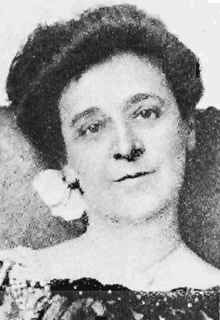Florence Elfelt Bramhall
Florence Elfelt Bramhall (April 2, 1862 – December 22, 1924) was an American clubwoman and forest conservationist, based in Minnesota. She headed women's club efforts to create the forest preserve that became the Chippewa National Forest.
Early life
[edit]Florence Adelaide Elfelt was born in Saint Paul, Minnesota, the daughter of businessman Abram S. Elfelt and Susan Carroll Fryer Elfelt.[1][2] Her parents were both born in Pennsylvania; her family was Jewish,[3] and her father was a founder and president of the B'nai B'rith Lodge in Saint Paul.[4][5][6]

Career
[edit]Bramhall was active in the leadership of the Minnesota Federation of Women's Clubs and president of the Saint Paul Women's Civic League. She worked with the city on building playgrounds,[1] and took a particular interest in forest conservation. In 1901 she spoke before the Minnesota state senate on the subject.[7]
Bramhall and professor Maria Sanford are credited with ensuring the preservation of over 600,000 acres of pine forest in Minnesota,[8][9] now part of the Chippewa National Forest, the first national forest east of the Mississippi River.[10] In addresses to the State Forestry Association, the State Horticultural Association, and the State Agricultural Association,[11] Bramhall advocated a "forest park" concept, with scientific forestry practices.[12][13] "It is impossible to think that people can be so blind to their own interests and the interests of the state as to let that magnificent forest be destroyed," she told the St. Paul Globe in 1900.[14]
In 1903 Bramhall declined a nomination for president of the Minnesota Federation of Women's Clubs, preferring not to compete with "even a respectable minority opposition" for the executive post.[15][16] In 1904, she represented Minnesota state forestry association at a national congress on forestry held in Washington, D.C., when Theodore Roosevelt delivered the address "The Forest in the Life of a Nation."[17]
Personal life
[edit]Elfelt married twice. Her first husband was Bahamas fisheries owner Robert Francis Pyfrom; they married in 1883[18] and divorced a few years later. Her second husband was lawyer William Bramhall; they married in 1888.[19] She died in 1924, aged 62 years.[10]
References
[edit]- ^ a b Who's who Among Minnesota Women: A History of Woman's Work in Minnesota from Pioneer Days to Date, Told in Biographies, Memorials and Records of Organizations. M.D. Foster. 1924. p. 35.
- ^ Leonard, John William (1914). Woman's Who's who of America: A Biographical Dictionary of Contemporary Women of the United States and Canada, 1914-1915. American Commonwealth Company. p. 123.
- ^ "The Jewish Community in St. Louis Park". St Louis Park Historical Society. Retrieved 2022-01-01.
- ^ "The Elfelt Brothers: Edwin, Charles & Abram, Early Jewish Pioneer Merchants of St. Paul Minnesota". JMAW, the Jewish Museum of the American West. Retrieved 2022-01-01.
- ^ Folsom, William Henry Carman (1888). Fifty Years in the Northwest: With an Introduction and Appendix Containing Reminiscences, Incidents and Notes ... Pioneer Press Company. pp. 564–565.
- ^ "Died of Heart Disease". The Saint Paul Globe. 1888-04-05. p. 5. Retrieved 2022-01-01 – via Newspapers.com.
- ^ "Asks for Park Reservation". The Saint Paul Globe. 1901-04-03. p. 2. Retrieved 2022-01-01 – via Newspapers.com.
- ^ "Featured Scientists: Maria Sanford & the Minnesota Federation of Women's Clubs". Aldo Leopold Nature Center. 2016-09-08. Retrieved 2022-01-01.
- ^ Searle, Newell. "Minnesota National Forest: The Politics of Compromise, 1898-1908" Minnesota History (Fall 1971): 249-252.
- ^ a b Brown, Curt (October 27, 2018). "Remembering two women who helped save Minnesota forests". Star Tribune. Retrieved 2022-01-01.
- ^ Brady, Tim (2007). Gopher Gold: Legendary Figures, Brilliant Blunders, and Amazing Feats at the University of Minnesota. Minnesota Historical Society. p. 101. ISBN 978-0-87351-601-3.
- ^ Steinson, Elizabeth Ley. "Ojibwe Absent Narratives in Minnesota Forest Park History" (MA thesis, St. Cloud State University, March 2018): 83.
- ^ "Forest Must be Saved; So Say Minnesota Club Women After Touring Leech Lake Region". The Saint Paul Globe. 1900-06-17. p. 2. Retrieved 2022-01-01 – via Newspapers.com.
- ^ "Forest Must be Saved; So Say Minnesota Club Women After Touring Leech Lake Region". The Saint Paul Globe. 1900-06-17. p. 2. Retrieved 2022-01-01 – via Newspapers.com.
- ^ "Declines to Accept; Mrs. W. E. Bramhall Gives Federation a Surprise". The Saint Paul Globe. 1903-10-16. p. 7. Retrieved 2022-01-01 – via Newspapers.com.
- ^ "Women's Club Gossip". The Saint Paul Globe. 1903-10-22. p. 7. Retrieved 2022-01-01 – via Newspapers.com.
- ^ Jermans, W. W. (1904-12-31). "President Will Talk on Forests". The Minneapolis Journal. p. 3. Retrieved 2022-01-01 – via Newspapers.com.
- ^ "Wedding Bells". The Saint Paul Globe. 1883-08-23. p. 14. Retrieved 2022-01-01 – via Newspapers.com.
- ^ "Bramhall-Pyfrom". The Saint Paul Globe. 1888-08-02. p. 8. Retrieved 2022-01-01 – via Newspapers.com.
External links
[edit]- Florence Elfelt Bramhall, "Women's Interest in Forestry" The Minnesota Horticulturist (August 1908): 294–298; a speech Bramhall gave to the state horticultural association

